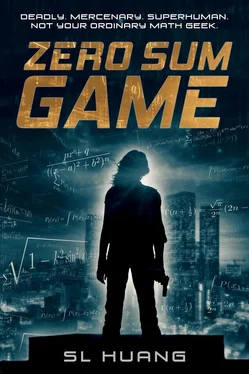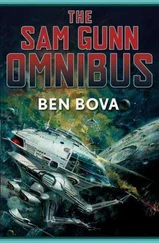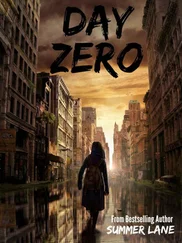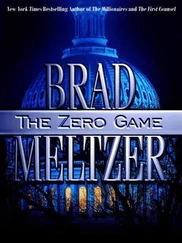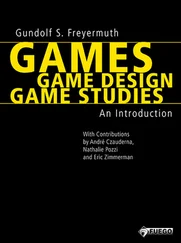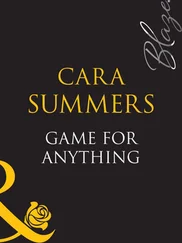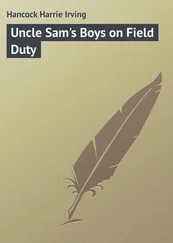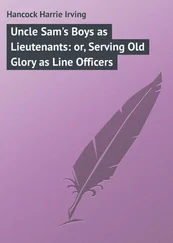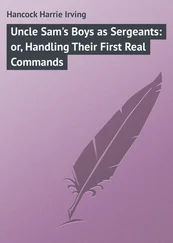And they wouldn’t be able to. At least not for a good while. We’d made sure of that.
I still wasn’t sure whether we should be proud of what we’d done or not. I tried not to think about it too hard, and to remind myself every so often of what Pithica had done to people like Reginald and Leena Kingsley. And to Courtney Polk, the client I hadn’t been able to rescue in the end.
I also tried to remind myself of how much I liked winning. I’m not going to lie; that helped.
We didn’t manage to contact Checker for several days, since Arthur refused to let me steal a working satellite phone from the aid workers rebuilding the infrastructure. It turned out that Dawna, never having met Checker, had completely misjudged what he would do and probably never would have found him anyway. After Rio had dropped him off at his car, Checker had driven non-stop; as soon as he had hit a town where the lights were still on, he had gone, not to break into an electronics store in the middle of the night, but instead to a well-groomed residential neighborhood…where he had knocked on a reasonably pleasant-looking door, asked if they knew what was happening in Southern California, and told them that he needed emergency access to a computer with a network connection. Then he had offered all the cash we’d sent him off with up in payment for the use of said computer. The very nice, middle-class family who lived in the house had been impressed by his earnestness (and the offer of so much money), had felt he was reasonably nonthreatening, and had invited him to set up in the living room with one of the parents’ work laptops. I gathered that they’d even made him pancakes and bacon for breakfast and offered for him to stay in their spare room until LA was sorted out.
Checker, not sure whether Pithica was still after him, politely declined the offer (although he did admit to accepting their college-aged daughter’s number on the sly, which might have made her parents less inclined to trust him, had they known), and then sold his car to a chop shop for some quick capital and set himself up with a fake ID and some temp work in small-town Arizona while he waited for us to contact him. It turned out he was a remarkably street-savvy guy.
“What were you going to do if you never heard anything?” I asked, curious.
“Cry my eyes out that Cas Russell apparently met an ignominious and gruesome death at the hands of her very stupid plan,” he answered.
I laughed and then told him about Rio’s deal. Despite what we had done, we would be safe enough from Pithica in the future. Checker said he’d be on a bus back to LA as soon as he could find a line that was running. “And now that it’s safe for me to use a credit card again, I’m going to fill a suitcase with laptops to bring back with me.”
“Leave it to you to black-market circuit boards during this time of crisis,” I said.
“Cas Russell, what do you think of me? I need to repair the Hole. A suitcase full of laptops is barely a start.”
I didn’t mention that by meeting up with some old clients at some old haunts, I’d taken five jobs in getting people black market electronics in the past three days. Disaster was good for business.
The official explanation for the EMP hit the airwaves during the week after the event, and was some hand-waving about a solar storm. I wondered what Pithica had done to pull that off. It kind of impressed me that they had done it, considering the dire straits they had to be in after what we’d pulled. But they were about helping humanity to the very end, and apparently that included cleaning up their own mess to some degree, which to them meant at least making sure nobody started bandying around the word “terrorists” or could point to a nuclear attack as an excuse to start a war with someone. The country ran fundraisers and Red Cross drives to help the poor Angelenos struck by such a freaky natural disaster, but world politics as a whole suffered no more than it had from the last bad hurricane.
Arthur was severely concussed enough that he stayed with me for a few days in my apartment in the Valley. Since the concussion was my fault, I didn’t mind waking him up in the middle of the night to ask him how many fingers and who was president. In return, he tried to nag me about taking it easy until my chest wound healed completely—something about adrenaline not being a substitute for proper convalescence—but I mostly ignored him. When he felt well enough, he took advantage of the massive chaos in the city to go in and report at a police station that he’d woken up in an alley with short-term amnesia and realized he was the victim of a crime. He filled out a police report on what had happened to his office while claiming not to remember any of it and was supported in all ways by his obvious recent head wound. The LAPD, swamped with a devastated and fracturing city, quickly filed the case away under unsolved gang-related violence.
By then a horrifically tortured man had shown up in a hospital and been identified as the sole survivor of the office massacre on Wilshire. Considering that he couldn’t stop gibbering madly about an Asian devil, and that no bodies had ever been recovered from the Griffith Park shooting despite the wildly conflicting witness reports of the violence there, Arthur’s and my composites got shuffled off the “most wanted” boards. I wondered if the surviving Pithica man had any inkling that he probably owed his life to Rio magnanimously getting the police off my trail.
As for Rio himself, I tracked him down a little over a week after the EMP disaster. We met in an empty subway station—the trains still weren’t up and running, and the station was deserted, though someone had stopped by with copious amounts of spray paint and already graffitied over every surface. Gotta love LA.
Instead of coming down from street level, Rio walked casually into the station on the track, emerging out of the yawning darkness of the tunnel with his duster swirling around him and wearing a broad-brimmed felt hat that only enhanced the cowboy image.
“Are you auditioning for the Old West?” I asked, hopping down off the platform to join him on the rails.
“The American frontier would suit me, I think,” he said. “What did you wish to see me about?”
“The police aren’t after me anymore,” I said. “Thanks for not killing that guy.”
He lifted one shoulder fractionally. When I didn’t say anything else, he asked, “Is that all?”
“No.” I’d been doing a lot of thinking since our final battle with Dawna. The memories of her attack still shifted and blurred, fuzzier with each passing day, the pieces I was able to jigsaw together making less and less sense. And every frustrating contradiction led me not to Pithica, not to Dawna—but to Rio.
Rio was keeping something from me.
And I was going to find out what. I just didn’t know how to ask him.
“Are you going to keep your deal with Dawna?” I asked finally.
“Yes,” he said.
“She neutralized us, you know.” Arthur and I had tested it late one night, and neither of us would be looking into Pithica ever again. We couldn’t. We couldn’t even try. “She told us not to come after them again, and we can’t. I doubt they’re even keeping an eye on me anymore. They know I’m not a threat to them.” I crossed my arms, hugging my jacket to me against the underground chill. “Could you talk me out of it? Destroy their influence?” He’d done it before, after all.
“Probably,” said Rio.
“Will you?”
“No.”
“Why not?” I exploded. The possibility had been the one thing that might have made his deal make sense, if he had figured somehow that I could do more damage to Pithica in the future than he could, and therefore had a life worth trading for Dawna’s—again. “Why did you even make that deal, then?”
Читать дальше
